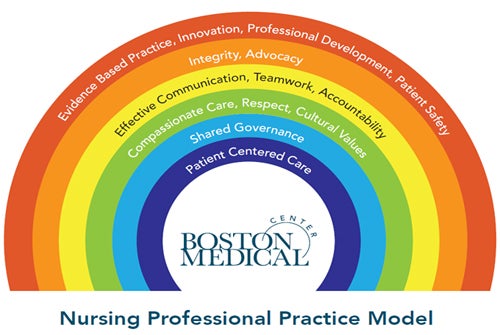We are unique individuals with strengths and weaknesses. We are diverse and come from different cultures and backgrounds. We have different talents, skills, and experiences, but share a common goal. We learn from each other to become more creative and excel in our respective roles to provide the best care possible.
2024 Nursing Annual Report Available Now
Our Professional Practice
At Boston Medical Center, our nurses are at the heart of improving health care every day. Through innovation, research, and collaboration, our team of over 1,700 nurses works tirelessly to deliver compassionate, patient-centered care. By partnering with patients, families, and other caregivers, we ensure every voice is heard, every cultural value is respected, and every clinical decision is guided by what matters most to our patients. Together, we deliver on our promise of "Exceptional Care Without Exception."
Guided by our professional practice model, we align our nursing care with BMC's mission, values, and goals. This model emphasizes patient-centered care, shared governance, and cultural awareness, ensuring that care is evidence-based and deeply personal. Our nurses prioritize listening, involving patients in their care, and tailoring their approaches to honor the unique cultural identities and needs of those we serve. Its philosophy underscores the dignity and respect at the core of everything we do.
We also believe in collaboration and empowerment. Through shared governance, all nurses at BMC play an active role in decision-making that enhances practice, improves patient outcomes, and strengthens staff satisfaction. By fostering teamwork and accountability, we create an environment where nurses thrive professionally while delivering the highest standard of care. At BMC, our nurses don't just provide care - they lead the way in shaping what compassionate, innovative nursing looks like today and in the future.
Our professional practice model insures that our practice is consistent regardless of where the care is provided.

* Special thanks to the clinical nurses at Council Congress and throughout BMC who designed and implemented our nursing professional practice model.
Patient-Centered Care
“Patient-Centered Care is care that is respectful of, and responsive to, individual patient preferences, needs and values, and ensures that patient values guide all clinical decisions” (IOM, 2015).
Patient-centered care is the practice of caring for patients (and their families) in ways that are meaningful and valuable to the individual patient. It includes listening to, informing, and involving patients in their care.
As advocates, nurses provide compassionate care with dignity, respect, and sensitivity to patients’ cultural values and autonomy.
Shared Governance
BMC nursing leadership endorses shared governance.
Shared governance is collaboration among all nurses, whether in scheduling staff, educating new staff, or implementing evidence-based practice. It involves teamwork, problem-solving, and accountability, with the goals of improved staff satisfaction, productivity, and patient outcomes. It is working together to make decisions that affect nursing practice and patient care.
We are committed to interprofessional collaboration focused on the primacy of patients. Institutions that utilize shared governance at the organizational, departmental, and unit levels experience decreased turnover rates and increased nursing satisfaction.
The Cultural Care: Diversity and Universality Theory
The Cultural Care: Diversity and Universality Theory by Dr. Madeleine Leininger was developed to guide in the provision of culturally congruent nursing care provided to diverse populations.
BMC Professional Nurses have a duty to provide supportive care that is tailored to specific individual and groups and consider what is culturally valued and believed by those populations (Leininger, 1988; 1996). BMC Nurses consider and incorporate those meaningful values into the patients' plan of care so that patients and families feel respected. Nurses at BMC create goals and nursing care interventions that incorporate special cultural values important to their patients and families.
 ht
ht 
 English
English Français
Français Deutsch
Deutsch Italiano
Italiano Español
Español Tiếng Việt
Tiếng Việt